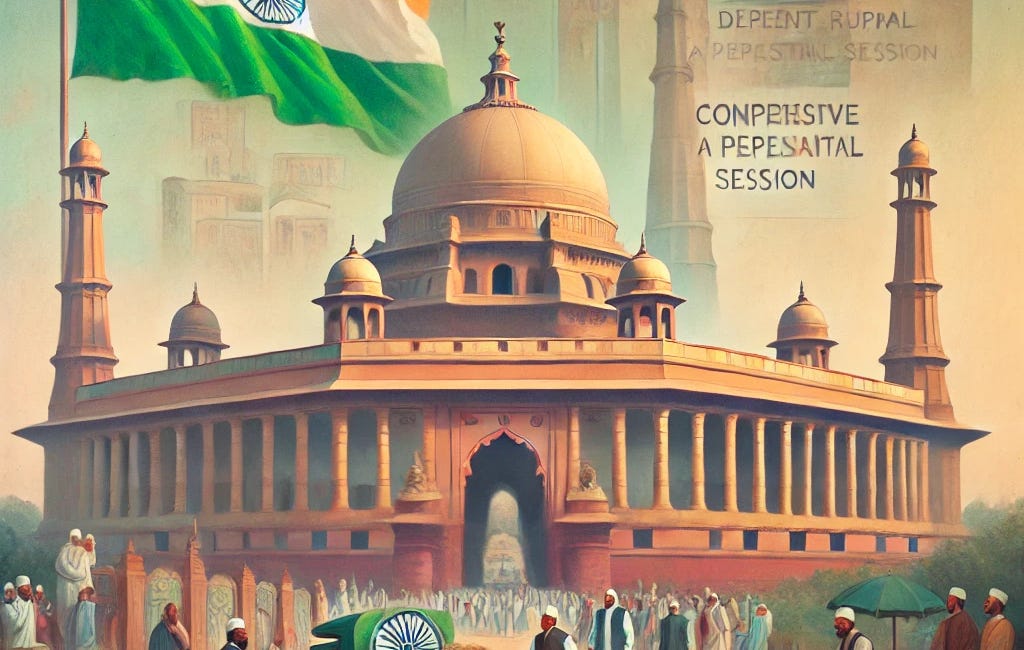Modern Muslim Philanthropy in India: Moving Beyond Traditional Waqf Structures
Do Muslim Philanthropists Like Azim Premji and Shah Rukh Khan Still Use Waqfs for their Charities?
Modern Muslim Philanthropy: Embracing Flexible and Inclusive Structures
Introduction
Contemporary Muslim philanthropists in India are increasingly turning to diverse and flexible frameworks for their charitable work, moving beyond the traditional waqf system that has long served as a foundation for community support. By establishing trusts, Section 25 (now Section 8) companies, and leveraging corporate social responsibility (CSR) initiatives, these philanthropists—often leaders in business and industry—are adopting structures that offer greater autonomy, transparency, and adaptability.
This shift reflects a broader evolution in philanthropic goals, with a focus on reaching a wider spectrum of social causes and beneficiaries beyond the conventional waqf mandates. While the waqf system remains integral to the Muslim community, the limitations as well as inefficiencies of state-governed waqf boards have prompted many affluent and progressive Muslims to seek alternative pathways that better align with modern philanthropic practices.
In light of these trends, the government’s ongoing deliberations on waqf board reform present an opportunity to re-evaluate how waqfs can be strengthened and adapted to meet contemporary needs. By enhancing governance and accountability within waqf boards, the reform process could support both traditional and modern approaches to philanthropy, allowing the waqf system to coexist and complement newer charitable models.
Emerging Philanthropic Structures Among Indian Muslims
1. Preference for Trusts and Section 25 Companies
Prominent Muslim philanthropists are gravitating toward trusts, societies, and Section 25 companies (now Section 8 companies under India’s Companies Act 2013) over the waqf system. Structures such as these allow philanthropists to enjoy more control, operational flexibility, and less bureaucratic oversight than waqfs, which are regulated by state-appointed waqf boards.
Azim Premji Foundation: Structured as a Section 25 company, the foundation is dedicated to educational initiatives across India and has become a model of philanthropic vision with over $2 billion in funds.
Meer Foundation (Shah Rukh Khan): Established as a Section 25 company, this foundation focuses on social and humanitarian causes, particularly supporting acid attack survivors.
2. Broader Charitable Focus
While waqfs are generally bound to community-specific causes and religiously guided mandates, alternative structures allow philanthropists to broaden their focus. For instance, Azim Premji’s foundation targets education reform without religious boundaries, contributing to a more inclusive model of social impact.
3. Transparency and Accountability
The modern structures of trusts and Section 8 companies come with heightened reporting and accountability standards, which improve transparency and inspire confidence among donors. By contrast, waqf institutions often face criticism for a lack of transparency, and administrative inefficiencies due to state governance. As a result, wealthy Muslim philanthropists prefer newer models that align with international standards.
Notable Muslim Philanthropists and Their Charitable Structures
Azim Premji
Through the Azim Premji Foundation, the Wipro founder has used a Section 25 company framework to lead educational reforms, funding over 1,500 non-profits. His philanthropic model exemplifies a shift towards secular, inclusive charity that benefits all, irrespective of religion.
Yusuff Ali
Yusuff Ali, chairman of the LuLu Group, actively contributes to charitable causes through The Y Foundation. His approach spans disaster relief and infrastructure, benefiting people across communities in India and the Gulf.
Khwaja Abdul Hamied
The founder of Cipla, Hamied has used corporate social responsibility (CSR) to engage in philanthropy, emphasizing healthcare access. Though Cipla remains a private entity, it channels significant funds to benefit underserved populations without focusing on religious affiliation.
Shah Rukh Khan
Through the Meer Foundation, Khan has supported numerous social causes, including healthcare and legal aid for underprivileged groups. This organization operates as a Section 25 company and prioritizes inclusive initiatives beyond religious communities.
Financial Muscle of Major Muslim-Led Charitable Foundations
Azim Premji Foundation: A Monumental Endowment
The Azim Premji Foundation represents one of the most powerful philanthropic forces in India. With an endowment valued at approximately $29 billion (INR 2,40,000 crore) as of early 2023, the foundation draws heavily from Premji’s extensive ownership in Wipro Limited, with 67% of his stake devoted to charitable causes. Notably, in 2019, Premji pledged an additional 34% of his Wipro shares—amounting to Rs 52,750 crore—underscoring his commitment to impactful, large-scale charity. This formidable corpus allows the Azim Premji Foundation to invest in sustained educational reforms and other socially transformative projects throughout India, placing it among the most resource-rich philanthropic bodies in the country.
Corporate-Led CSR: Cipla and LuLu Group International
The Cipla Foundation, closely aligned with Cipla Limited's Corporate Social Responsibility (CSR) initiatives, also contributes significantly to social welfare. Cumulatively, Cipla spent over a billion rupees on CSR activities by the fiscal year 2020, reaching hundreds of thousands across India. As a company-driven foundation, Cipla’s charitable activities are tied to CSR regulations, requiring Indian corporations to allocate 2% of their average net profit over the last three years to social causes. Similarly, LuLu Group International, led by M.A. Yusuff Ali, supports a broad range of humanitarian activities, although specific corpus details for the Y Foundation remain undisclosed. Ali’s philanthropic efforts include notable disaster relief donations, such as ₹9.5 crores for Kerala flood relief in 2018, reinforcing his commitment to community support and crisis response in India and beyond.
Traditional vs. Contemporary Structures: The Waqf Dilemma
1. Comparing Waqfs with Alternative Structures
Waqfs are limited by state governance and often focused on religious or community-specific projects. By contrast, trusts and Section 8 companies offer flexibility, financial control, and administrative autonomy, attracting modern philanthropists who desire greater operational independence and broader social impact.
2. Legal Implications and Inclusivity
In India, establishing a religiously focused charity is legally permissible under the Trusts Act. However, certain structures, like public trusts, may require clear declarations of inclusivity to comply with secular mandates. While Muslim philanthropists can create trusts exclusively for Muslim beneficiaries, most prominent charitable organizations in India, including those by Muslims, pursue a secular mission, embracing all communities.
3. Social and Economic Influence
Unlike waqf institutions, which rely on donations and state aid, trusts and Section 8 companies can operate with economic efficiency, guided by professionals and subject to rigorous audits. This appeals to affluent philanthropists, who may see the waqf system as lacking the innovation and scalability required for contemporary social issues.
Challenges and the Need for Waqf Reform
The trend away from waqfs among educated and affluent Muslims reflects growing dissatisfaction with the current waqf administration, which is often mired in inefficiency and outdated management practices. For waqfs to remain relevant, there may be a need to:
Improve Governance: Introducing modern governance practices can boost waqf credibility and efficiency.
Expand Scope: Redefining waqf purposes beyond community-specific projects could attract a more diverse base of donors and beneficiaries.
Encourage Professional Management: Adopting professional management standards could help waqfs operate on par with modern trusts and Section 8 companies.
Summing Up: Embracing Modern Philanthropy while Preserving Tradition
The shift from traditional waqfs to diverse philanthropic structures marks a pivotal evolution in Muslim charitable practices. While waqfs have long played a crucial role in supporting social services within the Muslim community, many modern philanthropists are choosing alternative frameworks that offer greater flexibility, inclusivity, and transparency. This trend expands the reach and impact of Muslim philanthropy in India, highlighting the potential benefits of reform within waqf administration to meet the demands of a changing social landscape.
As the Joint Parliamentary Committee deliberates amendments to the Central Waqf Act, it is essential to clarify that these reforms aim to strengthen, not hinder, Muslim charitable efforts. The new enactment does not intend to obstruct charity by or for Muslims; in fact, various legal structures and methodologies remain available for Muslim philanthropists to support diverse causes. Many progressive Muslim leaders are already utilising these alternatives to pursue impactful, large-scale charity. Therefore, the notion that the Government’s waqf reforms will stymie Muslim philanthropy is misleading1. Instead, these reforms could foster a more robust, accountable, and inclusive framework for charitable endeavours, benefiting not only the Muslim community but society as a whole2.
Waqf (Amendment) Bill 2024 Introduced in Lok Sabha: Referred to Joint Parliamentary Committee
Waqf (Amendment) Bill Introduced in Lok Sabha






Your essay on.Muslim charity is refreshing. I congratulate the KBS for bringing it out. I t enriched my understanding on the problem. 🎊